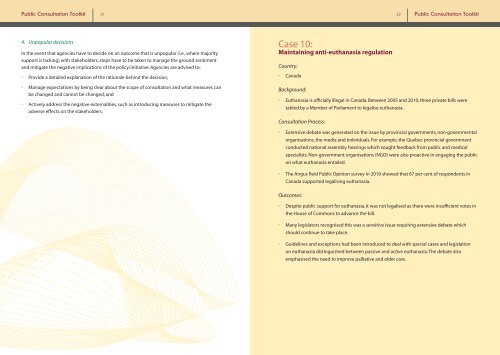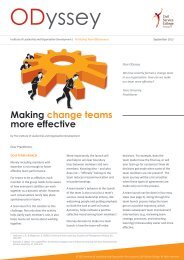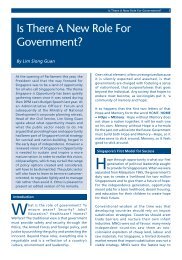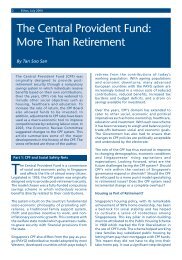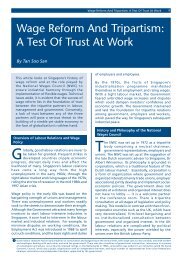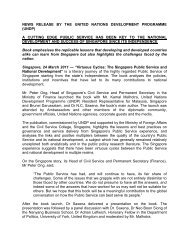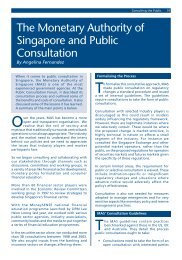Public Consultation Toolkit - Civil Service College
Public Consultation Toolkit - Civil Service College
Public Consultation Toolkit - Civil Service College
Create successful ePaper yourself
Turn your PDF publications into a flip-book with our unique Google optimized e-Paper software.
<strong>Public</strong> <strong>Consultation</strong> <strong>Toolkit</strong> 31 32 <strong>Public</strong> <strong>Consultation</strong> <strong>Toolkit</strong><br />
4. Unpopular decisions<br />
In the event that agencies have to decide on an outcome that is unpopular (i.e., where majority<br />
support is lacking) with stakeholders, steps have to be taken to manage the ground sentiment<br />
and mitigate the negative implications of the policy/initiative. Agencies are advised to:<br />
• Provide a detailed explanation of the rationale behind the decision,<br />
• Manage expectations by being clear about the scope of consultation and what measures can<br />
be changed and cannot be changed; and<br />
• Actively address the negative externalities, such as introducing measures to mitigate the<br />
adverse effects on the stakeholders.<br />
Case 10:<br />
Maintaining anti-euthanasia regulation<br />
Country:<br />
• Canada<br />
Background:<br />
• Euthanasia is officially illegal in Canada. Between 2005 and 2010, three private bills were<br />
tabled by a Member of Parliament to legalise euthanasia.<br />
<strong>Consultation</strong> Process:<br />
• Extensive debate was generated on the issue by provincial governments, non-governmental<br />
organisations, the media and individuals. For example, the Quebec provincial government<br />
conducted national assembly hearings which sought feedback from public and medical<br />
specialists. Non-government organisations (NGO) were also proactive in engaging the public<br />
on what euthanasia entailed.<br />
• The Angus Reid <strong>Public</strong> Opinion survey in 2010 showed that 67 per cent of respondents in<br />
Canada supported legalising euthanasia.<br />
Outcomes:<br />
• Despite public support for euthanasia, it was not legalised as there were insufficient votes in<br />
the House of Commons to advance the bill.<br />
• Many legislators recognised this was a sensitive issue requiring extensive debate which<br />
should continue to take place.<br />
• Guidelines and exceptions had been introduced to deal with special cases and legislation<br />
on euthanasia distinguished between passive and active euthanasia. The debate also<br />
emphasised the need to improve palliative and elder care.


